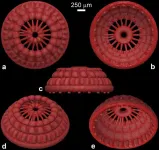(Press-News.org) Nursing homes that use a chlorhexidine bathing routine to clean the skin, and an over-the-counter antiseptic to clean the nose, prevent serious infections and reduce the amount of antibiotic-resistant organisms in the nursing home setting, according to the findings of researchers at Harbor-UCLA Medical Center, the University of California, Irvine, and the Centers for Disease Control and Prevention (CDC). The findings were published today in the New England Journal of Medicine.
“The cleansing protocol, called universal decolonization, substantially reduced the number of nursing home residents requiring hospitalization due to infection,” said lead author and Lundquist Investigator, Loren Miller, MD, MPH. Dr. Miller is the Chief of Infectious Diseases at the Lundquist Institute for Biomedical Innovation at Harbor-UCLA Medical Center in Torrance, California.
The study, “Nursing Home Decolonization for Infection and Hospitalization Prevention,” involved nearly 14,000 residents at 28 California nursing homes in Orange and Los Angeles counties and was funded by the U.S. Agency for Healthcare Research and Quality (AHRQ).
Robert Otto Valdez, PhD, MHSA, director of AHRQ, said that for an older person “having an infection and needing to be transferred to the hospital for care can be life-threatening. Now nursing homes have another tool to help them prevent infections, reduce transfers, and keep our older adults safe.”
On any given day, more than 1 million people live in the nation’s 15,000 nursing homes. Each year, 3 million healthcare-associated infections (HAIs) such as methicillin-resistant Staphylococcus aureus (MRSA), bloodstream and urinary tract infections occur in U.S. nursing homes. Residents are at high risk for these infections due to age, wounds, medical devices, and complex illnesses.
MRSA and other pathogens can live on a person’s skin and in their nose without making them sick. Proactively removing the potentially harmful bacteria can reduce the chances of developing an infection or spreading it to others.
During the 18-month study, Dr. Miller and his team compared 14 nursing facilities using standard bathing routines with 14 facilities using the antiseptic soap chlorhexidine and nasal swabs with povidone-iodine (iodophor) to remove pathogens from residents’ skin and nose.
Both antiseptic products have been used in healthcare for more than 60 years.
The nursing homes following the decolonization protocol saw a significant reduction in the overall prevalence of multidrug-resistant organisms, including MRSA, vancomycin-resistant Enterococci and other resistant bacteria. No change in the prevalence of multidrug-resistant organisms was detected in residents of nursing homes that used routine bathing.
“CDC is excited to see the results of a nursing home-focused infection prevention intervention being published. Given the growing concern of harm from antimicrobial-resistant germs in nursing homes, the impact of this decolonization bathing program is quite important and provides a concrete action that facilities can use to protect nursing home residents,” said Nimalie Stone, MD, senior advisor for long-term care in CDC’s Division of Healthcare Quality Promotion, and technical advisory panel member for the trial.
In the routine bathing nursing homes, an average of six residents were hospitalized for infection each month per 100 occupied beds. In contrast, nursing homes using the enhanced bathing routine had two fewer residents hospitalized for infection per month per 100 occupied beds. The decolonization routine didn’t need to be perfect to prevent infection and hospitalization: 87% used the antiseptic soap as intended; 67% used the iodine-based nasal swab as intended.
“Our findings suggest that changing to an antiseptic soap and cleaning the nose with iodophor is a highly effective way to prevent dangerous infections in nursing homes,” said Miller. “Compared to other healthcare strategies, this is a relatively simple win for nursing homes. We hope nursing homes will want to adopt it.”
Dr. Miller’s team worked in tandem with the team of Dr. Susan Huang at University of California, Irvine (UCI) to conduct this clinical trial. Dr. Huang is a leader in the field of infection prevention and the medical director of epidemiology and infection prevention for UCI Health and the Chancellor’s Professor of Infectious Diseases at UCI School of Medicine.
Dr. Miller is a nationally recognized expert treatment and prevention of antibiotic-resistant infection. The findings add to a growing body of Dr. Miller’s research that has been funded by NIH, AHRQ, and other federal sources.
END
Lundquist Investigator Dr. Loren Miller is the lead author of the “universal decolonization” study published in the New English Journal of Medicine
AHRQ-funded study finds “universal decolonization” lowers hospital transfers due to infection from methicillin-resistant staphylococcus aureus (MRSA)
2023-10-11
ELSE PRESS RELEASES FROM THIS DATE:
Renting rather than owning a private sector home linked to faster ‘biological ageing’
2023-10-11
The biological impact of renting, as opposed to owner occupancy, is nearly double that of being out of work vs having paid employment, the findings suggest.
Fortunately, these effects are reversible, emphasising the importance of housing policy in health improvement, say the researchers.
Numerous aspects of housing are associated with physical and mental health, including cold, mould, crowding, injury hazards, stress, and stigma. But exactly how they might exert their effects isn’t entirely clear, say the researchers.
To explore this further, they drew on epigenetic ...
Genes may be responsible for third of complex regional pain syndrome cases
2023-10-11
But the condition is less common in men, even though they are more likely to have the 4 genetic variations implicated in heightened risk, suggesting that there may be sex specific causes, say the researchers.
Most cases of CRPS are usually triggered by an injury, with the skin of the affected body part hypersensitive to the slightest touch or temperature change. CRPS is difficult to treat, and while it often improves with time, some people experience intense pain for many years.
But why some people develop CRPS yet others don’t after the same injury, isn’t clear. ...
Singapore’s smoke-free law may have warded off 20,000 heart attacks in over 65s
2023-10-11
The extension was associated with a monthly fall in the rate of heart attacks, with older people and men benefitting the most from the move.
Second-hand smoke exposure is responsible for 1.3 million annual deaths around the globe, many of which are caused by heart attacks, note the researchers.
But the existing evidence on the health benefits of comprehensive smoke-free laws, which many countries (67 since 2003) have implemented, is largely confined to indoor smoking bans rather than those for housing estates and outdoor spaces, they say.
In 2013 Singapore extended smoke-free legislation ...
Death is only the beginning: Birds disperse eaten insects’ eggs
2023-10-11
Relationship patterns among flightless stick insects suggest that birds disperse the eggs after eating gravid females. Lab experiments previously suggested the possibility, but a new genetic analysis of natural populations in Japan by Kobe University researchers now supports the idea.
Most species of stick insects are flightless, yet they are distributed over wide distances and across geographical features that would impede the expansion of flightless animals. This has caused researchers to speculate that their eggs might be dispersed by birds feeding on gravid females, much in the same way as many plant species rely on birds eating their seeds together ...
Early Cambrian microfossils preserve introvert musculature of cycloneuralians
2023-10-11
An international research team led by Prof. ZHANG Huaqiao from the Nanjing Institute of Geology and Palaeontology of the Chinese Academy of Sciences (NIGPAS) has reported the discovery of extraordinary early Cambrian (ca. 535 million years ago, or Ma) microfossils preserving the introvert musculature of cycloneuralians, a group of animals that include roundworms, horsehair worms, mud dragons, and many other creatures.
The discovery added fleshy insights into early Cambrian cycloneuralians, which are closely related to arthropods, the most successful animals on Earth.
The ...
Bringing out the color in zinc
2023-10-11
Zinc is an important element that is found widely in biological systems, is cheap to manufacture relative to other metals, and has low toxicity. However, unlike other similar metals that exhibit a variety of vibrant colors in metal complexes, seeing different colors for zinc materials was not thought possible.
In a study published recently in Angewandte Chemie International Edition, researchers from the Institute of Industrial Science, The University of Tokyo, have synthesized a complex with two zinc ions that does exhibit color—greatly expanding the ...
Non-melanoma skin cancer killing more people than melanoma, new study finds
2023-10-11
(Wednesday, 11 October 2023, Berlin, Germany) Non-melanoma skin cancer (NMSC) is causing a greater number of global deaths than melanoma, the more serious form of skin cancer, a new study presented today at the European Academy of Dermatology and Venerology (EADV) Congress 2023 has found.1,2
Researchers also believe that NMSC is underreported and that the true impact of this disease may be even higher than estimated.3
Professor Thierry Passeron, lead author of the study, explains, “Although NMSC is less likely to be fatal than melanoma skin cancer, its prevalence is strikingly higher. In 2020, NMSC accounted for 78% of ...
Obesity leads to a complex inflammatory response inside fat tissue
2023-10-10
Fat tissue, for as much as it’s been vilified, is an incredibly complex and essential bodily organ involved in energy storage and hormone production, among other functions. Yet, modern lifestyles have led to a worldwide epidemic of obesity, and a corresponding increase in related conditions like type 2 diabetes and cardiovascular disease.
Researchers are attempting to uncover the basics of how fat tissue is structured and, specifically, inflammation associated with obesity, in the hopes of unlocking the connection between the accumulation of fat and poor health outcomes.
A new study from Lindsey Muir, Ph.D., Ph.D.-candidate Cooper Stansbury, and their colleagues ...
STARTUP Central project will educate and support biomedical researchers turning innovations into new companies
2023-10-10
LAWRENCE — Bringing an idea from a lab to patients and consumers can be a complicated and intimidating process involving patents, governmental regulations, product development, business structuring, hiring issues and many more complex considerations.
Now, a $3 million initiative based at the University of Kansas will empower biomedical researchers in public universities and colleges across several Plains states to carry their innovations to the marketplace.
The effort involves both a private firm based at KU Innovation Park, Continuum Educational Technologies PBC, and KU researchers working under a new $3 million grant from ...
Protein key to placental heath could be target for reproductive conditions
2023-10-10
New Haven, Conn. — Immune cells play a key role during pregnancy, adjusting immune system response in a way that enables the fetus to develop while also protecting the parent and fetus from outside assaults like viruses. In a new study, Yale researchers found that a particular protein found throughout the body plays a major role in this important immune system modulation, affecting placental health early in pregnancy.
The findings, they say, could lead to new treatments for reproductive conditions in the future.
The study, led by Yale School of Medicine’s Reshef Tal, was published Oct. 10 in the journal JCI Insight. A human fetus contains ...
LAST 30 PRESS RELEASES:
Bacteria frozen in ancient underground ice cave found to be resistant against 10 modern antibiotics
Rhododendron-derived drugs now made by bacteria
Admissions for child maltreatment decreased during first phase of COVID-19 pandemic, but ICU admissions increased later
Power in motion: transforming energy harvesting with gyroscopes
Ketamine high NOT related to treatment success for people with alcohol problems, study finds
1 in 6 Medicare beneficiaries depend on telehealth for key medical care
Maps can encourage home radon testing in the right settings
Exploring the link between hearing loss and cognitive decline
Machine learning tool can predict serious transplant complications months earlier
Prevalence of over-the-counter and prescription medication use in the US
US child mental health care need, unmet needs, and difficulty accessing services
Incidental rotator cuff abnormalities on magnetic resonance imaging
Sensing local fibers in pancreatic tumors, cancer cells ‘choose’ to either grow or tolerate treatment
Barriers to mental health care leave many children behind, new data cautions
Cancer and inflammation: immunologic interplay, translational advances, and clinical strategies
Bioactive polyphenolic compounds and in vitro anti-degenerative property-based pharmacological propensities of some promising germplasms of Amaranthus hypochondriacus L.
AI-powered companionship: PolyU interfaculty scholar harnesses music and empathetic speech in robots to combat loneliness
Antarctica sits above Earth’s strongest “gravity hole.” Now we know how it got that way
Haircare products made with botanicals protects strands, adds shine
Enhanced pulmonary nodule detection and classification using artificial intelligence on LIDC-IDRI data
Using NBA, study finds that pay differences among top performers can erode cooperation
Korea University, Stanford University, and IESGA launch Water Sustainability Index to combat ESG greenwashing
Molecular glue discovery: large scale instead of lucky strike
Insulin resistance predictor highlights cancer connection
Explaining next-generation solar cells
Slippery ions create a smoother path to blue energy
Magnetic resonance imaging opens the door to better treatments for underdiagnosed atypical Parkinsonisms
National poll finds gaps in community preparedness for teen cardiac emergencies
One strategy to block both drug-resistant bacteria and influenza: new broad-spectrum infection prevention approach validated
Survey: 3 in 4 skip physical therapy homework, stunting progress
[Press-News.org] Lundquist Investigator Dr. Loren Miller is the lead author of the “universal decolonization” study published in the New English Journal of MedicineAHRQ-funded study finds “universal decolonization” lowers hospital transfers due to infection from methicillin-resistant staphylococcus aureus (MRSA)



